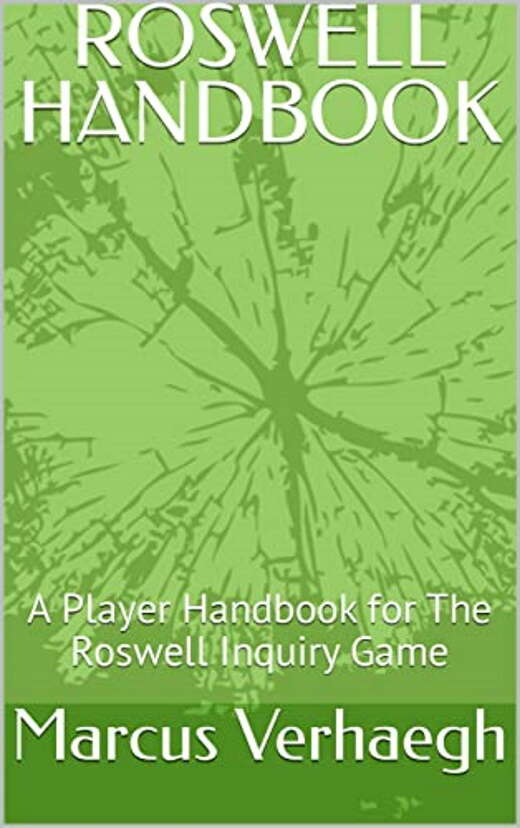Publisher: M J Verhaegh Gaming
The Roswell Inquiry is a table-top RPG based on a theme of investigating the possible presence of aliens on Earth, with a special focus on potential alien-contact in the deserts of the American Southwest. Players begin by making characters born in the 1908-1928 period. These characters have various ‘real world’ background – physicians, physicists, discharged soldiers & airmen, etc. One can even be an agent of La France, or a Mormon…. However, the characters are called in to investigate ‘alien phenomena’ in New Mexico. From their experiences in the desert, they evolve into a team of investigators who run afoul of the interest of various governments, in ‘alien’ technology. (As time goes on, a younger generation of player-character can continue the party’s investigative legacy….)
This handbook contains that limited amount of information which can be shared with players at the start of the game. For Game Masters, there is a further work: Roswell Campaign.
***********
Attribute statistics are the basic statistics of a character, sketching the character’s inherent capacities and abilities. Further characters have Origins and skills.
To create a character, Attributes, Origins, and starting skills all need to be chosen. Further the character needs a name, a gender, and a date of birth.
Attributes:
Dexterity
Strength
Constitution
Perception
Intelligence
Intuition
Origin Points
Player characters start with a base of 5 Origin points. Origin points are expended on Origin Pools. Origins create affiliations, assisting social ties during game-play, and also provide for some extra starting skills.
SECTION TWO: Actions
Basic Actions
Most actions are purely narrative-based. Player-characters (PC’s) can utter words, i.e., talk. Player-characters have position in space and can walk, run, drive, etc. So, ‘I start the car’ is another basic action often available. Going to the right place at the right time, is another thing that is often, very important.
Further, characters can investigate or search, as in ‘I search the desk in the corner.’
Statistic Checks
At times, there are statistics requirements - whether for an action proper or a passive action (e.g., a perception or good reaction). For example, ‘Characters with Art History 3 and Perception 5 who study the painting, will automatically notice there is a signature on the painting.’ Then no die is thrown but the requirements are automatically met, or automatically fail.
In other cases, Stat-check will be required. If an Attribute or Skill is at a quantity sufficiently high for an action to succeed, but still a basic Stat-check is indicated as required, then the character rolls a d6 (six-sided dice). All results but 1 indicate success.
Special Actions – Self-Diagnosis
At times, characters will be able to determine important items about their own mental state. So, e.g., let’s imagine the Scenario description read to the player is, ‘You see a swirl of green lights and then a reptilian creature with a spear emerges from the Buick.’ The Scenario description might further specify to the GM, ‘A Stat-check on Psychology 3’ allows the player to determine, the wavy character of the visual field indicates a possibly altered mental-state.
Special Actions – Research
As stated, it is possible in various ways for PC’s to research (in-game) what is happening, and this includes using contacts or going to libraries, etc. Also it is possible to engage in specific game-dynamic called ‘expend Research Points.’ This leads to extra expenditure of resources, in terms of calling in favours, bothering people on the phone who can only be bothered so much, spending petty-cash, etc. In some cases, expending Research Points will lead to research breakthroughs, otherwise not possible.
 Price: $0.99
Price: $0.99

No comments:
Post a Comment